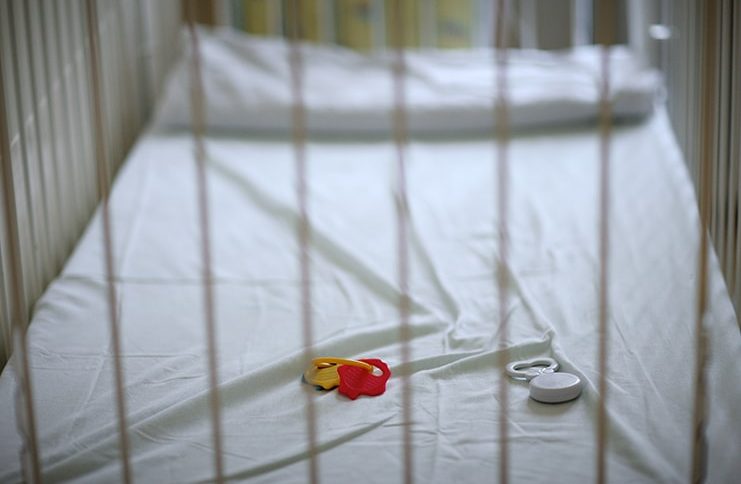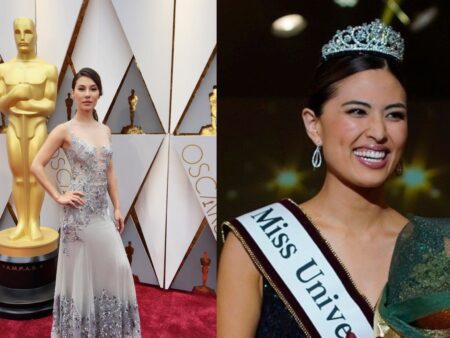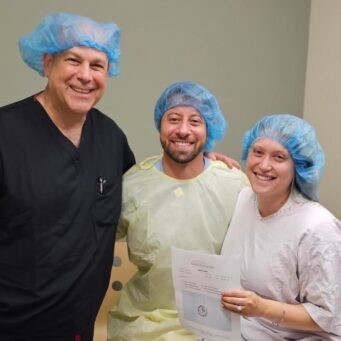
I’m good at looking on the bright side. As in you-might-need-special-goggles-for-the-light good. If you need to find the positive side of a broken dish (well, now there’s more room on the shelf) or a power outage (hello, Uno time!) or a flat tire at night on an unpaved mountain road in Costa Rica in the rain (it’s sure one way to find the kind-hearted locals), I’m your girl. It’s how I came to write three books on optimism in the past six years, because when it comes to looking on the bright side, I got this. But my biggest hope hurdle to date has been finding the positive twist day after day, year after year, throughout my futile attempts to start a family with my husband.
My first miscarriage came days before the three-month milestone, after I’d marked my due date on the calendar and planned where the crib would fit in the nursery. It played out over eighteen hours—from flashes of a horror movie in our home to my husband sitting beside my hospital bed, quietly staring at the pallid walls.
The second miscarriage was uneventful, but for the sound of my deep exhale of disappointment.
The third simply broke my heart: Nearly three months pregnant again, my visiting mother-in-law held the thin, shiny printout of our ultrasound photo in her hands as my sister-in-law said with tears in her eyes, “I’m so going to spoil this baby!” The next afternoon, we lost that one, too, as I sat doubled over in the bathroom, silently sobbing, trying not to ruin everyone’s good time.
If we really want to help someone, let’s sit beside her in the darkness and listen, so she can get it out, make sense of it, and find her own light in her own time.
But I did what I was supposed to do: I stayed focused on our happy ending in the distance, using the lampposts along the path. I found the bright spots when I was diagnosed with a genetic disorder (whew, at least that explained it), which led to a few years of belly-stabbing IVF treatments (hey, it’s even more time to prepare for parenthood), and eventually completing the adoption home study process (how better to appreciate the child we’ll have than to fight this hard for one). And I stay bright today, as we await a birthmother who believes my husband and I are the right loving couple to adopt and raise her baby.
But you know, I’m human. So I would get sad, too. Sometimes it was a long day of the blues. Sometimes it was waking up at 3 a.m. to sob as I pictured the life I was supposed to have as a mother pass by without me. Most often, it was a quick burst of crying alone in a bathroom somewhere — again — when the emptiness hit me. But as an ardent believer that we attract what we feel, I tried not to linger on the sad stuff. Plus, I never felt right bringing people down with the story of my struggle—everyone has her own problems, right? And mine paled in comparison to what some people in the world were battling. So if anyone ever asked how I was doing, I’d put on my happy mask and amp myself up for the cheerful version.
“I’m doing great!” I’d say. “After all, my husband and I are going to end up with the child we’re meant to have. And once that baby is in our arms, all of this will have been worth it.” All smiles. All optimism. All good.
After a while, though, I couldn’t summon the energy I needed to pull those smiles off as often, so every now and then, I’d sprinkle in a pinch of honesty: “As hopeful as I am,” I’d add, “it’s still tough having to rub my friends’ pregnant bellies at their baby showers, you know?”
And that’s where I noticed something discouraging: As soon as I crossed the street onto the shadier side, it’s as if people would panic. Aaack, why is my positive friend saying something negative?! And they’d wave me right back to the bright side, talking me through all the positive angles they were sure I hadn’t seen. “Yeah, but,” they’d say, “you’re going to end up with the child you’re meant to have. And once that baby is in your arms, all of this will have been worth it!”
So back across the street I’d go, hopping to the sunny side of the sidewalk and nodding along about how grateful I was. Lucky, really. Yeah, sure, who wants a straight path to motherhood when there’s so much to learn from a challenge?
I know why we humans cheerlead for one another: We’re uncomfortable in the face of each other’s pain and we don’t want people we care about to suffer. So we grab our pompoms and wave ‘em around a lot: “Yeah, but sunshine! And cocktails! And happiness!” Yet what some people don’t seem to realize is that those of us struggling with infertility know about the light at the end of the tunnel; we know that at some point we’ll be the ones filling up our friends’ Facebook feeds with our cooing babies and drooling babies and laughing babies and…yeah, lots o’ baby comin’, people. But until then, we sometimes feel broken and tired and just want to curl up with a bottle of wine and a bag of Flamin’ Hot Cheetos. (Or is that combination just my thing?)
Eventually, I got so tired of hearing people explain what I “should” be feeling (hopeful), that I simply stopped sharing what I was feeling (hopeful…but drained). Really, it was just easier to keep the sad side hidden and cry alone in a bathroom.

An Unexpected Lesson
After a while, though, I got tired of crying alone. And then I got tired of crying at all. So I figured a good way to get my mind off my own struggles was to try to help others through theirs. And seeing as I was so good at this whole “bright side” thing, I applied to volunteer as a crisis counselor on a suicide hotline, figuring I’d get on the phones and, you know, cheer people up. But soon into our months-long training, I learned that our role wasn’t to find the bright side for people at all; it was to sit in the darkness beside them.
I noticed something quickly once I got on the lines — that so many callers shared the same refrain: They didn’t want to burden anyone with their pain, so they put on their own happy masks and suffered behind closed doors. Which is exactly what led to a crisis for one young mother of two who — overwhelmed by depression and exhaustion — wore her happy mask all the way to Home Depot to purchase the rope she would use to try and end her life.
Yet what some people don’t seem to realize is that those of us struggling with infertility know about the light at the end of the tunnel.
When hearing from a woman like that it’s tempting to want to shake her right back into her positive senses: “Yeah, but you have kids who need you!” “Yeah, but you have friends who care about you!” Yeah, but…she knew all that. It’s just that, alone in her dangerous, silent grief, she believed she’d be giving her family a happier life without her. And the more callers I heard this from—people hiding their pain from friends, family, and doctors—the more it became obvious to me that we all needed to stop hiding.
I’ve been taking calls on the crisis hotline for three years. And I’ve learned more than I ever imagined about life by talking to people on the brink of theirs. But I take this home above all else: It is not our place to find the optimism for other people. Hope isn’t a magic trick, like lifting a top hat to reveal a bunny: “Ta-da! Here it is, silly! That warm and fuzzy point of view was right in front of you all along!” Everyone has a burden or battle, right?
When someone shares that pain, it is not our place to suggest she just look on the bright side instead. If we really want to help someone, let’s sit beside her in the darkness and listen, so she can get it out, make sense of it, and find her own light in her own time. Really, if we don’t have anything but “yeah, but” to say, we shouldn’t say anything at all.
It’s not that I haven’t appreciated people trying to help cheer me up (I have!) and it’s not that some people don’t offer support in a more compassionate way (they do!). But having sat on both sides of grief now, I appreciate more than ever the value of being allowed to express my honest self.
I still turn things bright side up when I need to. I just did it an hour ago when I knocked over an entire bucket of water in the kitchen (well, that’s one way to get a floor clean fast). But trust me, if looking on the bright side was the answer to infertility, my husband and I would have enough children for a TLC reality show by now!
Each of us is the boss of our own optimism and I turn to it when I need it, but it’s also not the whole picture. The way I see it, happiness isn’t about feeling giddy every second; happiness is about the balance of all the big emotions. We’re not less for feeling more. And with struggle comes strength, empathy, and gratitude. Really, how better to appreciate all the good in life than by making it through some of the bad?
Having sat on both sides of grief now, I appreciate more than ever the value of being allowed to express our honest selves.
To my comrades going through a struggle — any struggle — here’s what I find helps: Telling people how to listen. “It’s been up and down,” you can say. “I’m totally hopeful—so I don’t need advice or optimism or ideas; I’m just venting here, okay? Because sometimes it’s hard, feeling like a failure and wondering when it’ll be my turn to get some good news.” And for those loved ones who hear you? Oh, what sweet relief it is to download how you really feel, without all those “yeah, buts” pushing back in return. I now see this kind of sharing as vital to our emotional survival—and sometimes, as I learn every week on the crisis line, to our literal survival. There simply needs to be a lot less crying alone in bathrooms, for all of us.
How am I doing now? I’m a little of everything: I’m amped, over it, joyful, jealous, helpless, excited…it depends on the hour. But the more I’ve learned to acknowledge and share my full range of feelings with the people around me, the stronger and happier I’ve become. Most important, though, I’m as hopeful as ever and focused on my happy ending because I know — so I don’t need reminding, I assure you — that my husband and I will end up with the child we are meant to have. And once that baby is in our arms? All of this will have been worth it.
Contributor
Amy Spencer
Amy Spencer is a Los Angeles-based magazine journalist, ghostwriter and author of Bright Side Up: 100 Ways to Be Happier Right Now, which offers ideas for finding your own optimism, in your own time. She and her husband are approved as an adoptive family and are on a waiting list with an open adoption agency.

Listen to stories, share your own, and get feedback from the community.

















